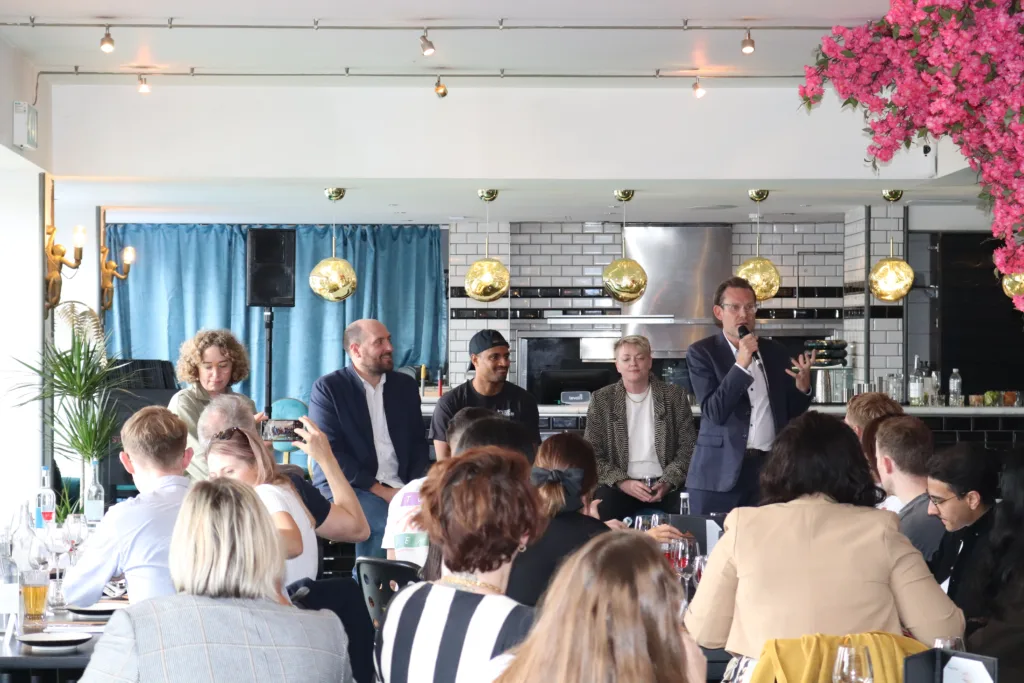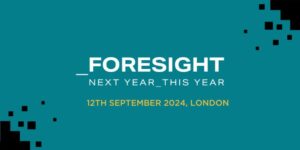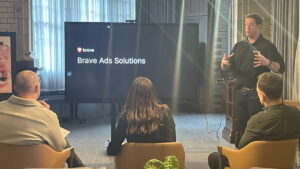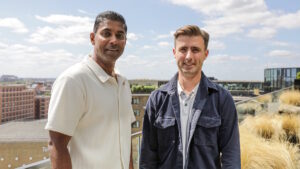Are current models of media buying helping to fuel prejudice and misinformation against LGBTQIA+ people? What more can the industry do to redress the balance in favour of a more inclusive, progressive and positive media landscape?
NDA, in partnership with Outvertising, Publicis Groupe, Boots and Diversity Media Sales, recently hosted a panel discussion in central London addressing the alarming rise in anti-LGBTQIA+ sentiment in the UK and looking at how the media and advertising industries can help to improve things. The session took place at the inaugural Media Pride lunch event, held at a brand-new restaurant overlooking Tower Bridge.
NDA’s editor Justiin Pearse hosted the discussion and was joined by Marty Davies, Joint CEO, Outvertising; Jerry Daykin, VP, Head of Global Media at Beam Suntory and Diversity Ambassador for the WFA; Chris Kenna, Chief Executive Officer (North America & LATAM) of Brand Advance and Kate Williams, Director of Diversity, Equity and Inclusion, Publicis Groupe.
Davies opened the discussion with a stark set of statistics that made for uncomfortable listening. She told the gathered audience: “Research has shown that, in the space of the past 5 years, the UK has dropped from being the number one country in Europe for LGBTQIA+ rights all the way down to 17th. Transgender-related hate crimes are up by 56% over the ‘21-’22 period according to government statistics.”
Since the discussion new government figures published on 5 October for a period running up until end of March ‘23 reveal an increase of 11% from the previous year – taking it to record-breaking levels. In addition, YouGov recently found that 25% of the people in the UK now have negative feelings towards the trans community in particular, and those stats are starting to leak into sentiment about the wider community.
Davies said: “We’re all facing so many big issues at the moment – cost of living, political instability and so on – that this hasn’t really registered as an emergency yet on many people’s radar, but I think we’re certainly at a crisis point. As a community LGBTQIA+ people attract attention and the media want to generate attention, so the media’s coverage of LGBTQIA+ is often sensationalised simply to drive clicks. That’s a big issue and something that we need to actively try to reverse.”
Since the discussion, Prime Minister Rishi Sunak leaned further into transphobic rhetoric when he said, “We shouldn’t be bullied into believing people can be any sex they want to be, they can’t. A man is a man and a woman is a woman.”
A state of emergency
Kenna called for those who currently class themselves as ‘allies’ of the LGTBQIA+ community to take a step further and become advocates instead. “Allyship has become a passive thing, it doesn’t help to achieve anything meaningful. It’s too easy to be an ally. Advocates on the other hand will stand shoulder to shoulder with the community and call out people, groups or media outlets when comments or ‘jokes’ are made. Advocates will be the ones to say ‘Please don’t say that sort of thing in my presence. It’s offensive and wrong.’ We can’t afford to be passive anymore.”
Williams agreed that being a true advocate for and friend to the LGBTQIA+ community will inevitably involve a certain level of ‘discomfort’. She explained: “I believe that we are in a state of emergency right now and we have to wake up to it. If you are going to engage in solidarity with the community, it means sharing the discomfort of that lived experience. That, unfortunately, is something that many people are not prepared to do. It’s about taking on board some of that discomfort and understanding that the discomfort you might experience is fairly fleeting, compared to the near constant discomfort that the LGBTQIA+ person may be living through. And that holds true across all kinds of different diversity issues.
“A recent census found that the people most likely to want to leave the media and advertising industries at the moment are LGBTQIA+ people and people of colour. What does that tell you about the contemporary experience for queer black women, for example?”
A uniquely hostile market
Daykin made particular reference to the current state of the UK media, saying: “There are challenges in many markets, especially the US, but it’s fair to say that the UK has a uniquely hostile media market, especially towards the trans community and increasingly towards the full LGBTQIA+ spectrum. That’s not simply my opinion, the United Nations reported as much a few months ago.
“As people who work in the industry, we’ve established brand safety measures to prevent brand ads appearing next to controversial content, but it’s time to actively stop ad money flowing to media titles that consistently pursue a damaging narrative against the LGBTQIA+ community.”
Davies encouraged the brand marketers in attendance to develop their own divestment strategy, if they hadn’t already done so. “You need to know where you are currently spending money on advertising and you need to establish what would lead you to re-evaluate that? Once you know what would or should trigger divestment and what that would look like in practice, real action becomes more likely.”
Kenna added that, as creatives, the marketing and advertising industries are uniquely placed to influence the narrative surrounding the LGBTQAI+ community. He said: “Our business is about telling stories and sparking emotions, about broadening understanding, often within 15 or 30 seconds. We have the power and we have the responsibility to use our talents to tell positive stories of the community and help change the world for the better.”
Blueprint for Change, from NDA, in partnership with Outvertising, a report designed to help businesses make LGBTQIA+ inclusivity a central part of their business, is available for free download here. .










